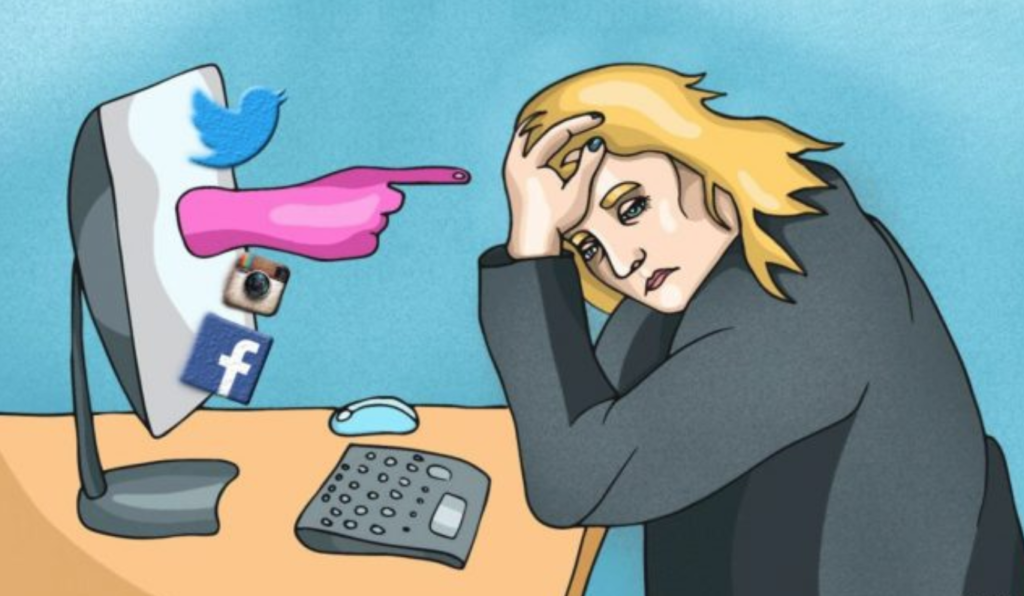Does Social Media Use Lead to Anxiety and Depression?

By Katie Van Lew
The twenty-first century, a technology-driven world, has introduced a plethora of ways to connect with people. Aside from the regular assets of a typical phone, such as calling and text messaging, devices such as the iPhone have the ability to download thousands of apps per the app store found on each device. Among adolescents, some of the most popular apps to download are Facebook, Instagram, Snapchat, and Twitter. Coinciding with social media use, many critics have speculated that the prevalence of anxiety and depression among adolescents is correlated with the rise in social media use.
During an eight-year study conducted by Sarah Coyne, a professor at Brigham Young University, Coyne has determined that the time spent on social media does not accelerate mental health problems; rather, it is the way in which social media is used. During the eight-year study, researchers examined 500 people between the ages of 13-20. Annually, researchers sent participants a questionnaire inquiring about the time spent on social media, along with a measure of their anxiety and depression levels. Ultimately, researchers came to the conclusion that although aging did equate to higher levels of social media use, they were unable to conclude that the frequency of social media use had a direct causation with mental health issues during adolescence.
Instagram, a picture and video sharing application, has approximately one billion users, with five hundred million people actively using the account each day. Because of Instagram’s active following, people are able to follow friends, celebrities, or virtually any account that sparks one’s interests. Instagram succeeds in serving its purpose of connecting users globally; however, at a more local and personal level, Instagram subconsciously induces feelings of exclusion from social settings.
“It’s my personal opinion that social media has the ability to damage the mental state of its users,” said Catholic University junior James Verby. “It can create feelings of anxiety and depression of a person to see things they don’t agree with, or to see friends hanging out without you.”
Social media hides under the guise of a platform that unites people through pictures and videos; yet the real problem lies within the lingering pressure to attain unrealistic, social perfection. An anxiety inducing effect of Instagram and other social media platforms is the pressure to have a certain amount of “followers” or “likes” on a photo. Instagram provides users with the ability to “like” media as well as view the users who have liked the content. Users that do not have a lot of followers, or do not receive the amount of “likes” that the individual deems as socially acceptable, may become anxious.
Additionally, the vastness of Instagram allows for people to follow their favorite celebrities; however, this can be bad as it may influence girls to deviate from their uniqueness and conform to an unachievable standard of “perfection”.
“Girls have it worse than guys because girls tend to be more self conscious of their image, popularity, and reputation,” said Catholic University sophomore Joe Keller. “However, the problem is everyone becomes so obsessed with their status quo in this social media world which is far from the true depiction of reality; therefore I blame the obsessive personalities that everybody has for the social media craze and not social media itself.”
“It 100% can increase anxiety if you have [anxiety] already and can definitely help develop it if you don’t have it already,” said Catholic University junior Chris Grunbok.
The impact of social media is not solely overwhelming for college students, but for children growing up in a world fixated on the newest of technological advancements.
“The older generations were introduced to it. I remember when Snapchat and Instagram were created,” said Catholic University senior Liz Spernal. “Growing up with it, we have been exposed to it longer, but the younger people have always known what social media was, and have been getting it at a younger age, which I do not think is healthy, but they are used to it.”
Spernal raises a pressing concern about how children today are immersed in the world of social media. Children today are growing up in a world that teaches them from birth that social media is an integral part of living during the twenty-first century. College students knew life before the development of the iPhone, and know life today where the iPhone and its access to social media dictates every aspect of an individual’s life, including one’s mental health.
Generally, students at Catholic University were surprised by the outcome of the research. Students ultimately did not believe that the research culminated sufficient evidence to conclude that social media use does not produce mental health problems.








